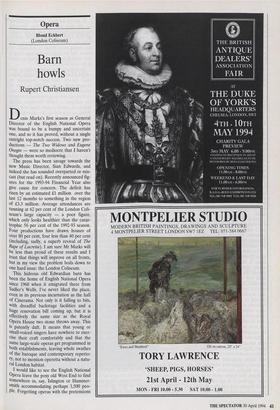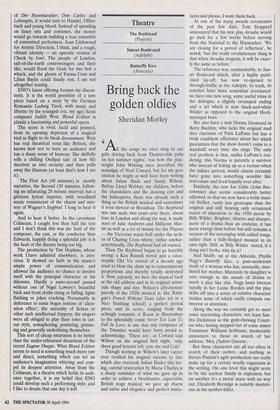Opera
Blond Eckbert (London Coliseum)
Barn howls
Rupert Christiansen
Denis Marks's first season as General Director of the English National Opera was bound to be a bumpy and uncertain one, and so it has proved, without a single outright top-notch success. Two new pro- ductions — The Two Widows and Eugene Onegin — were so mediocre that I haven't thought them worth reviewing.
The press has been savage towards the new Music Director, Sian Edwards, and indeed she has sounded overparted or mis- cast (but read on). Recently announced fig- ures for the 1993-94 Financial Year also give cause for concern. The deficit has risen by an estimated £1 million over the last 12 months to something in the region of £3.3 million. Average attendances are running at 62 per cent of the London Coli- seum's large capacity — a poor figure, Which only looks healthier than the catas- trophic 56 per cent of the 1992-93 season. Four productions have drawn houses of over 80 per cent, four less than 40 per cent (including, sadly, a superb revival of The Rape of Lucretia). I am sure Mr Marks will be less than proud of these results and I trust that things will improve on all fronts, but in my view the problem boils down to one hard issue: the London Coliseum.
This hideous old Edwardian barn has been the home of English National Opera since 1968 when it emigrated there from Sadler's Wells. I've never liked the place, even in its previous incarnation as the hall Of Cinerama. Not only is it falling to bits, With dreadful backstage facilities and a huge renovation bill coming up, but it is effectively the same size as the Royal Opera House two stone throws away. This is patently daft. It means that young or small-voiced singers have nowhere to exer- else their craft comfortably and that the same large-scale operas get programmed in both establishments, leaving whole swathes of the baroque and contemporary reperto- ry, not to mention operetta without a natu- ral London habitat.
I would like to see the English National Opera leave the poxy old West End to find somewhere in, say, Islington or Hammer- smith accommodating perhaps 1,500 peo- ple. Forgetting operas with the pretensions of Der Rosen/cavalier, Don Carlos and Lohengrin, it would turn to Handel, Offen- bach and young blood. Instead of spending on fancy sets and costumes, the money would go towards building a true ensemble of committed performers. Joan Littlewood for Artistic Direction, I think, and a rough, vibrant identity — an operatic version of Cheek by Jowl. The people of London, salt-of-the-earth costermongers and their like, would flood the Gods for two bob a whack, and the ghosts of Emma Cons and Lilian Baylis could finally rest. I am not altogether teasing.
ENO's latest offering focuses my discon- tents. It is the world premiere of a new piece based on a story by the German Romantic Ludwig Tieck, with music and libretto by the youngish (viz, my age) Scots composer Judith Weir. Blond Eckbert is plainly a fascinating and powerful opera.
The score is vivid, lucid and pointed, from its opening depiction of a magical bird in flight to its bleak denouement. Weir has real theatrical nous: like Britten, she knows how not to bore an audience and has a sharp sense of humour. She skilfully tells a chilling Oedipal tale of how life deceives us into security and then pulls away the illusions (at least that's how I see it).
The First Act (40 minutes) is mostly narrative, the Second (30 minutes, follow- ing an infuriating 20 minute interval) has a glorious lyrical impetus, with woodland music reminiscent of the charm and mys- tery of Wagner's Siegfried. I long to hear it again.
And to hear it better. In the cavernous Coliseum, I caught less than half the text and I don't think this was the fault of the composer, the cast, or the conductor Sian Edwards, happily doing a splendid job: it is the fault of the theatre being too big.
The production by Tim Hopkins, whose work I have admired elsewhere, is atro- cious. It showed no faith in the music's ample power of communication and allowed the audience no chance to involve itself with the principal character or his dilemma. Hardly a nano-second passed without one of Nigel Lowery's beautiful back and front cloths rising or falling, lights flashing or jokes cracking. Presumably in deference to some bogus notions of 'alien- ation effect', the unreality of fiction or other such intellectual frippery, the singers were all obliged to play their roles in cut- out style, semaphoring, posturing, grimac- ing and generally underlining themselves.
This sort of cheap smartness is no better than the under-rehearsed dreariness of the recent Eugene Onegin. What Blond Eckbert seems to need is something much more raw and direct, something which can set an audience's imagination whirring and com- pel its deepest attention. Away from the Coliseum, in a theatre which holds its audi- ence together, it is my belief that ENO could develop such a performing style; and I like to dream that one day it will.



























































 Previous page
Previous page